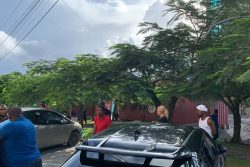Police Commissioner (ag) Nigel Hoppie has been left in a veritable quandary at the end of the latest bout of confrontation in public life – this time between the Executive and the Police Service Commission (PSC). The PSC on June 28 delivered to the Police Commissioner a list of 132 promotions which the government via the Attorney General on the same day described as “unlawful and illegal”. What will Mr Hoppie do with these appointments? There is yet to be a statement from Eve Leary which is no doubt examining the egg shells it must now trod.
The PSC’s list of appointments came rapidly after the decision of Chief Justice (ag) George-Wiltshire in relation to a case brought by Senior Superintendent of Police Calvin Brutus, which case had delayed promotions for more than six months. During the hiatus, a sub-plot developed wherein it was claimed that the Executive was moving to unseat the present members of the PSC so that it could exercise a measure of control over the promotion decisions of the PSC and related matters. This could have possibly explained the farcical elections for membership of the executive of the Guyana Police Association which is one of the bodies nominating members to the PSC.
Where the constitutionally enshrined service commissions are concerned, governments must act with great care and deference. The PPP/C and the current Attorney General have often shrilly repeated the several successful cases brought against the Granger administration in relation to the infringement of the authority of these bodies. The current government must therefore ensure it doesn’t commit the same breach.
It is not for the Attorney General or the government to dictate to the Police Commissioner whether the PSC promotions should be enlivened. That is a matter for the Police Commissioner in his own deliberate judgement and hopefully with legal advice if necessary.
The question of the validity of the promotions delivered on June 28 by the Chairman of the PSC, Paul Slowe and his commissioners will hinge on the constitutional rectitude of the actions of President Ali in seeking to suspend Mr Slowe and the other members of the PSC.
Article 225 of the Constitution which applies to the disciplining of members of the service commissions sets out how this process is to be accomplished.
Earlier last month, President Ali purported to suspend all the members of the PSC based on the advice given by Prime Minister Mark Phillips and which advice came following various allegations against members of the Commission.
In correspondence with one of the members, retired Assistant Commissioner of Police, Clinton Conway, President Ali said “Please be informed that by letters dated the 15th June, 2021, the Prime Minister of the Co-operative Republic of Guyana, the Honourable Brigadier (Retired) Mark Anthony Phillips, MSS, the prescribed authority under the provisions of Article 225 of the Constitution of Co-operative Republic of Guyana, has advised me that the question of your removal as a member of the Police Service Commission ought to be investigated and that you ought to be suspended from performing the functions of that office with immediate effect pending those investigations”.
The President further informed the PSC members that a tribunal would be established to conduct an investigation.
“In the circumstances, you are hereby suspended with immediate effect from performing the functions of Member of the Police Service Commission pending the establishment of the aforementioned tribunal,” the letter added.
Questions have however been raised as to whether the President has indeed discharged the constitutional steps to suspend the members. Article 225 (6) of the Constitution reads thusly “If the question of removing the officer from office has been referred to a tribunal under this article, the President, acting in accordance with the advice of the prescribed authority, may suspend the officer from performing the functions of his office, and any such suspension may at any time be revoked by the President, acting in accordance with such advice as aforesaid, and shall in any case cease to have effect if the tribunal recommends to the President that the officer should not be removed from office.”
Suspension, in the case of the chairman, requires that the question of removal be referred to a tribunal. This has not been done as the establishment of such a tribunal has to be accomplished with the advice and nominations of the Judicial Service Commission (JSC) which shockingly has not been recomposed since September 30th, 2017 – approaching four years. Furthermore, as it relates to ordinary members of the PSC, it is the Chairman, Mr Slowe who has to advise on suspensions and he has clearly not been approached on this matter.
The President’s actions therefore appear to be defective and the appointments by the PSC would appear to be valid notwithstanding the government’s attack on them. This is the dilemma that Mr Hoppie must contend with and he must ensure that his actions comport with fastidious adherence to the provisions of the Constitution.
The political undertones and overtones that have plagued the Guyana Police Force for decades at the hands of all governments whether, PNC, PPP/C or coalition must be extirpated as material damage continues to be done to the esprit de corps of the police force and its ability to effectively discharge its functions.
In her ruling on the Brutus case, CJ George-Wiltshire cited the “clearly deep-seated feelings of distrust and mistrust in the higher echelons of the Force” and added that “…for the sake of good governance of the Force some rapprochement will have to be found”. This advice should be heeded by all concerned.








